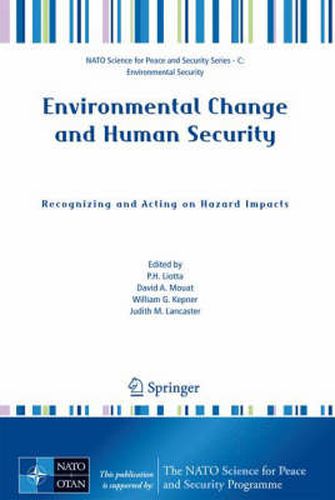Readings Newsletter
Become a Readings Member to make your shopping experience even easier.
Sign in or sign up for free!
You’re not far away from qualifying for FREE standard shipping within Australia
You’ve qualified for FREE standard shipping within Australia
The cart is loading…






This title is printed to order. This book may have been self-published. If so, we cannot guarantee the quality of the content. In the main most books will have gone through the editing process however some may not. We therefore suggest that you be aware of this before ordering this book. If in doubt check either the author or publisher’s details as we are unable to accept any returns unless they are faulty. Please contact us if you have any questions.
Environmental and Human Security: Then and Now 1 2 ALAN D. HECHT AND P. H. LIOTTA * 1 U. S. Environmental Protection Agency Office of Research and Development 2 Pell Center for International Relations and Public Policy Salve Regina University 1. Nontraditional Threats to Security The events of September 11, 2001 have sharpened the debate over the meaning of being secure. Before 9/11 there were warnings in all parts of the world that social and environmental changes were occurring. While there was prosperity in North America and Western Europe, there was also increasing recognition that local and global effects of ecosystem degradation posed a serious threat. Trekking from Cairo to Cape Town thirty years after living in Africa as a young teacher, for example, travel writer Paul Theroux concluded that development in sub-Saharan Africa had failed to improve the quality of life for 300 million people: Africa is materially more decrepit than it was when I first knew it-hungrier, poorer, less educated, more pessimistic, more corrupt, and you can’t tell the politicians from the witch-doctors (2002). While scholars and historians will debate the causes of 9/11 for some time, one message is clear: An often dizzying array of nontraditional threats and complex vulnerabilities define security today. We must understand them, and deal with them, or suffer the consequences. Environmental security has always required att- tion to nontraditional threats linked closely with social and economic well-being.
$9.00 standard shipping within Australia
FREE standard shipping within Australia for orders over $100.00
Express & International shipping calculated at checkout
This title is printed to order. This book may have been self-published. If so, we cannot guarantee the quality of the content. In the main most books will have gone through the editing process however some may not. We therefore suggest that you be aware of this before ordering this book. If in doubt check either the author or publisher’s details as we are unable to accept any returns unless they are faulty. Please contact us if you have any questions.
Environmental and Human Security: Then and Now 1 2 ALAN D. HECHT AND P. H. LIOTTA * 1 U. S. Environmental Protection Agency Office of Research and Development 2 Pell Center for International Relations and Public Policy Salve Regina University 1. Nontraditional Threats to Security The events of September 11, 2001 have sharpened the debate over the meaning of being secure. Before 9/11 there were warnings in all parts of the world that social and environmental changes were occurring. While there was prosperity in North America and Western Europe, there was also increasing recognition that local and global effects of ecosystem degradation posed a serious threat. Trekking from Cairo to Cape Town thirty years after living in Africa as a young teacher, for example, travel writer Paul Theroux concluded that development in sub-Saharan Africa had failed to improve the quality of life for 300 million people: Africa is materially more decrepit than it was when I first knew it-hungrier, poorer, less educated, more pessimistic, more corrupt, and you can’t tell the politicians from the witch-doctors (2002). While scholars and historians will debate the causes of 9/11 for some time, one message is clear: An often dizzying array of nontraditional threats and complex vulnerabilities define security today. We must understand them, and deal with them, or suffer the consequences. Environmental security has always required att- tion to nontraditional threats linked closely with social and economic well-being.